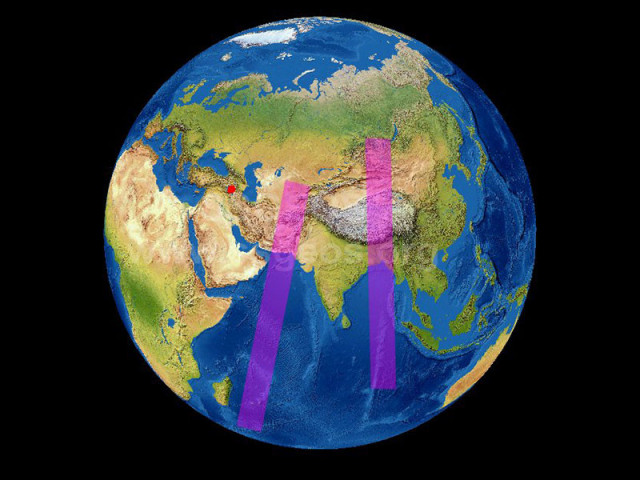Fact check: Are Pakistan, India at risk of a major earthquake?
Social media posts claim a major earthquake is likely to hit Pakistan and India in the next few days

Rumours have been circulating on social media and WhatsApp groups in Pakistan that a major earthquake is likely to hit the South Asian region—including Pakistan, India and other countries—in the next few days.
The rumours gained momentum when the Twitter handle of an organization calling itself the 'Solar System Geometry Survey (SSGEOS)' predicted seismic activity in some parts of South Asia based on lunar activity, the location and geometry of planets, and other celestial objects.
"Potential for stronger seismic activity in or near the purple band 1-6 days. This is an estimate. Other regions are not excluded," the tweet read.
Potential for stronger seismic activity in or near the purple band 1-6 days. This is an estimate. Other regions are not excluded. pic.twitter.com/YC7NJtEdbO
— SSGEOS (@ssgeos) January 29, 2023
The 'prediction' was followed by the same account tweeting a video of Dutch 'seismologist' Frank Hoogerbeets pointing at "potential" areas where seismic activity is likely to take place—including Pakistan, Afghanistan and India.
Larger seismic activity may occur from 4 to 6 February, most likely up to mid or high 6 magnitude. There is a slight possibility of a larger seismic event around 4 February.https://t.co/75I3PjAarX
— SSGEOS (@ssgeos) February 2, 2023
Hoogerbeets is being widely lauded online for "correctly predicting" the earthquakes in Syria and Turkiye. Social media and WhatsApp users have since been sharing videos of the Dutch 'researcher' predicting the potential earthquake in India and Pakistan.
But are these predictions true? Will an earthquake hit Pakistan and India in the next few days?
Based on science, the simple answers to the above two questions are: No, and we do not know.
Modern scientists, who have widely criticized Hoogberts and organisations like the SSGEOS for their flawed and unscientific approach, say it is impossible to predict earthquakes.
"Neither the USGS nor any other scientists have ever predicted a major earthquake. We do not know how, and we do not expect to know how any time in the foreseeable future," the United States Geological Survey (USGS) says on its website.
USGS scientists say they can only calculate the probability that a significant earthquake will occur in a specific area "within a certain number of years".
Read: Rescue teams, relief supplies from Pakistan arrive in Turkey
World-renowned science and engineering institute Caltech says, “it is not currently possible to predict exactly when and where an earthquake will occur, nor how large it will be”.
Hoogerbeets has been criticised by several scientists and experts online for claiming to accurately predict earthquakes.
"This account is quickly approaching 1 million followers, mostly from our region. Scientists agree there is no scientific method for earthquake prediction. Please don't let him take advantage of people's very real fears," tweeted Richard Salame, a journalist at Lebanese outlet L'Orient Today.
This account is quickly approaching 1 million followers, mostly from our region. Scientists agree there is no scientific method for earthquake prediction. Please don’t let him take advantage of people’s very real fears pic.twitter.com/MrSzPSu8HK
— Richard Salame (@rjsalame) February 7, 2023
In response to a video released by Hoogerbeets, Diego Melgar, an Associate Professor of geophysics at the University of Oregon, tweeted: "We call this 'snake oil' in the US. Could also be referred to as a 'quack'."
We call this "snake oil" in the US. Could also be referred to as a "quack". An "opportunistic buffoon" is another term that comes to mind...
— Prof. Diego Melgar 🌊 (@geosmx) February 6, 2023
The USGS says recent studies have found a correlation between earth tides caused by the moon's position and some types of earthquakes. However, the background probability is "very low in a given place and year", making it impossible to accurately predict an earthquake based on lunar activity.
The USGS states the following in the Frequently Asked Questions section on its website:
An earthquake prediction must define 3 elements: 1) the date and time, 2) the location, and 3) the magnitude.
Yes, some people say they can predict earthquakes, but here are the reasons why their statements are false:
- They are not based on scientific evidence, and earthquakes are part of a scientific process. For example, earthquakes have nothing to do with clouds, bodily aches and pains, or slugs.
- They do not define all three of the elements required for a prediction.
- Their predictions are so general that there will always be an earthquake that fits.



















COMMENTS
Comments are moderated and generally will be posted if they are on-topic and not abusive.
For more information, please see our Comments FAQ